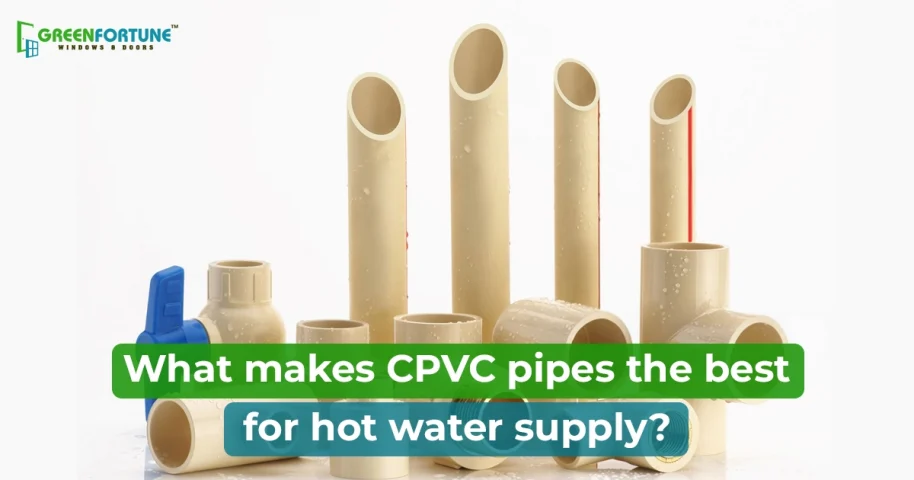
Single Floor Home Design Plans: A Guide to Stylish and Functional Living
April 14, 2025
Is Termite-Proof Plywood Worth It? Benefits and Considerations
April 15, 2025If you're planning to install hot water pipes at home, you’re probably wondering,
Should I go for PVC or CPVC pipe for hot water?
Are metal pipes a better option?
Which pipe is strong enough to handle the heat?
How long will it last?
Can it even handle boiling water?
Many people face the same confusion when setting up plumbing for hot water. So, you are not alone. The truth is, CPVC pipe is the best choice. We will explain why in this blog.
Let’s get started!
Also read: Differences between CPVC and uPVC.
First Things First: What Is CPVC?

CPVC is an abbreviation for Chlorinated Polyvinyl Chloride.
Now, don’t worry about the fancy full form. All you need to know is it’s a kind of plastic that has been treated specially so that it can handle hot water easily without melting, heating or getting damaged.
It looks very similar to regular PVC pipes, but it can take much higher temperatures. That’s the big difference.
CPVC Pipe For Hot Water: Why Is It The Best Option?
Here is why hot water CPVC pipe is a go-to choice for many households, hotels and hospitals.
1). Can handle high temperatures
If you are wondering can CPVC pipe be used for hot water, yes, it can be.
CPVC pipes can handle water temperatures up to 93°C (around 200°F). Even if you run very hot water through them, they won’t soften, warp, crack, burst or break.
2). No Corrosion or rust
When you choose metal pipes, there’s always a worry about them rusting or corroding over the years.
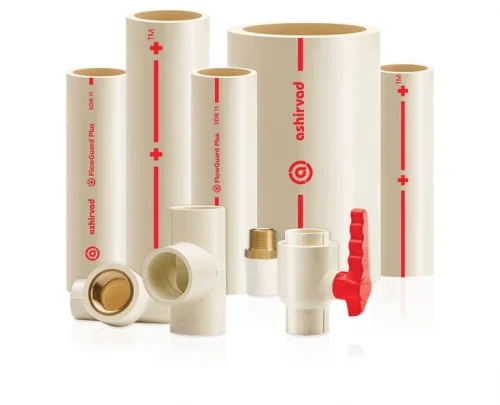
But CPVC pipes do not rust or corrode at all. They stay strong even after years of carrying hot water. So, they are easy to maintain and you may expect very less repairs.
3). Saves you money in the long run
It is normal for one to think, “CPVC is slightly more expensive than PVC” at the start. It’s true.
But it is costly because it lasts so much longer than you expect and saves you more money later. You don’t need to worry about any leakages, replacements or water damage- all of which can cost a fortune.
4). Easy to install
CPVC pipes are lightweight and so they are easy to cut and simple to join. It takes much less time and effort to install CPVC pipes.
5). Safe for drinking water
If you are thinking if CPVC ok for drinking water, it is.
CPVC pipes do not release harmful chemicals into water, even under heat. You can get clean and hygienic water without contamination from pipe materials.
Also read: How to choose the right water pipes for your home.
CPVC Vs PVC Pipe Hot Water

Feature | CPVC | PVC |
Can handle hot water | Yes, up to 93°C. | No. Can handle temperatures only up to 60°C. |
Suitable for drinking water | Yes. CPVC pipes are certified safe and non-toxic for drinking water. | Not recommended. PVC pipes are mainly meant for cold water or drainage. |
Risk of warping under water | Very low. CPVC pipes hold their shape even under continuous hot water usage. | Yes. PVC pipes soften and warp if hot water flows through them regularly. |
Long-term durability | Excellent. CPVC pipes last for decades. | Poor for hot water. PVC pipes will fail faster if exposed to heat often |
Cost | Slightly higher. CPVC pipes are costly but last for decades with minimal maintenance and repairs. | Lower. PVC pipes are a lot cheaper but are only suitable for cold water usage. |
The bottom line for your query, “Is CPVC better than PVC for hot water?”, the answer is YES!
- PVC is good for only cold water.
- CPVC pipe is good for both cold and hot water.
So, when setting up a hot water line, go for CPVC.
How Long Does CPVC Last?
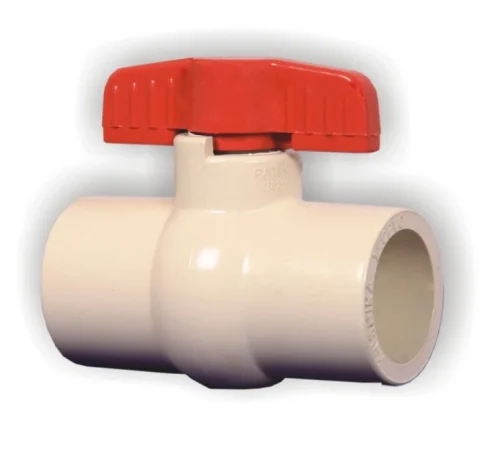
CPVC pipe for hot water can last for decades- to be specific, easily for 50 years without corroding, scaling or pitting.
Of course, this also depends on other things like,
- Quality of the CPVC pipe
- Water pressure
- How well it is installed
- Water quality (Very hard water can impact any material over decades)
But in normal conditions, you don’t need to worry about replacing your CPVC hot water pipes for decades. It’s a one-time investment!
Can CPVC Handle Boiling Water?
You know that CPVC pipe for hot water is the best choice. But you must understand that hot water and boiling water temperatures are not the same. The temperature of boiling water is 100°C (212°F).
CPVC can safely handle up to 93°C. Occasional flowing of boiling water, like for a few seconds or minutes is fine. CPVC pipes can handle it. But if you continuously run boiling water through the pipes, CPVC cannot handle it, and it is not recommended, either.
Advantages Of Using CPVC Pipe For Hot Water Over A Metal Pipe?
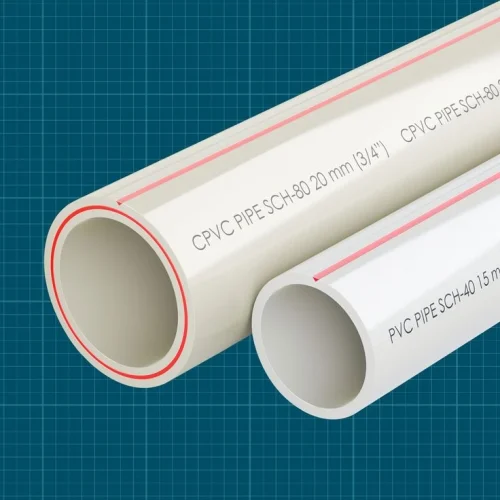
You might wonder, why not use metals like copper or GI? Here is why CPVC is better than them,
- CPVC pipes do not rust like metal.
- They do not scale inside, and water minerals don’t stick easily to CPVC.
- They do not require heavy maintenance as they do not corrode or leak.
- They are cost-effective and much cheaper than copper pipes.
- They are lighter, so easy to install without any heavy tools.
Also read: PVC Vs uPVC: Which is better?
Where Can You Use CPVC Pipes?
CPVC pipes are used wherever hot water is needed.
- Bathrooms and showers
- Kitchen sinks
- Geysers (water heaters)
- Solar water heating systems
- Industrial hot water lines
How To Identify Good Quality CPVC Pipes?
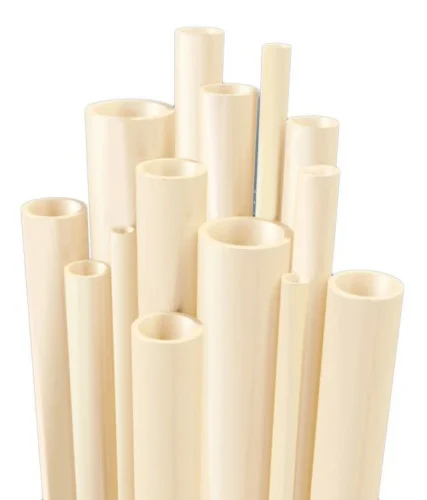
While buying CPVC pipes,
- Look for the ISI mark or NSF certification. This means that the pipe is tested and safe for use.
- Choose pipes from trusted brands.
- Make sure they are sturdy and not brittle.
A few hundred rupees spent on good quality will save you thousands in the future.
Note: Along with the CPVC pipe, buy CPVC fittings, too. Mixing materials can cause leaks. So, always match pipes and fittings.
Conclusion
CPVC pipe for hot water is your best bet, and there’s no room for any further discussion. Plumbers, engineers and builders usually prefer only CPVC pipes for hot water lines. They are affordable, strong, long-lasting, safe and easy to maintain. Just make sure to invest in high-quality CPVC.
Also read: How to fix dampness in the walls.
If you are looking to buy doors and windows for your home, check out GreenFortune’s uPVC products. They are highly durable, easy to maintain, eco-friendly, weather-resistant, soundproof, and affordable!
FAQs
1). What will happen if you use the wrong water pipe at home?
If you use the wrong pipe at home, there are chances for it to melt, burst crack or leak when hot water flows through it. When the water spills everywhere, it damages your walls or floors and costs you a lot to fix.
2). Will CPVC pipes crack in cold weather?
CPVC pipes are strong and flexible, so they usually don't crack easily in cold weather. But it is normal for any pipe to break if the water inside freezes. In order to avoid that, make sure the pipe is properly insulated.
3). Which pipe should you not use for hot water?
It is better to avoid PVC pipes for hot water because they can soften, lose their shape, and burst when exposed to heat. Always choose CPVC pipes for hot water systems.








